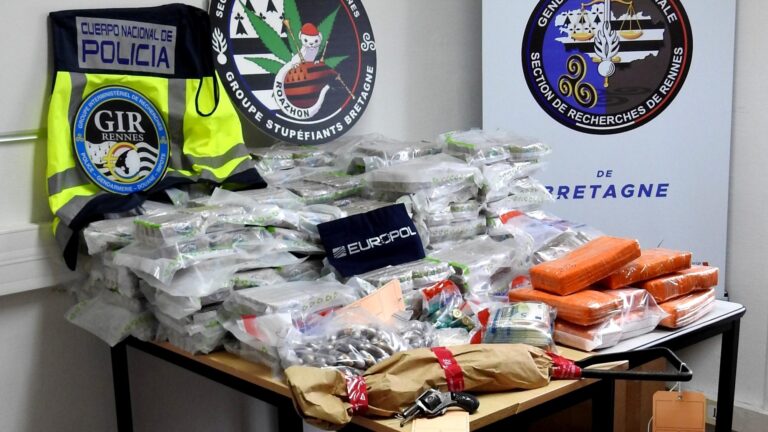Introduction
In recent years, France has witnessed a dramatic escalation in drug trafficking, transcending mere criminal activity to become a pressing national concern. This shift has not only alarmed law enforcement but has also sparked widespread debate among policymakers, citizens, and social commentators. As drug-related violence and organized crime ripple through urban centers and rural outskirts alike, the issue has come to symbolize deeper societal challenges. With the government grappling to formulate effective responses, the conversation around drug trafficking has evolved into a national cause‚Äîraising questions about public health, security, and the efficacy of France’s strategy in combating this pervasive threat. In this article, we explore the factors behind this tipping point, the implications for French society, and the urgent need for a multifaceted approach to tackle the drug crisis head-on.
Understanding the Surge: The Transformation of Drug Trafficking into a National Issue
The rapid escalation of drug trafficking in France has evolved from a regional concern to a pressing national crisis, demanding urgent political action and public awareness. The surge has been fueled by various factors, including increased availability of synthetic drugs, the rise of organized crime syndicates, and the social implications of addiction. As communities grapple with violence and social unrest attributed to drug-related activities, stakeholders are now realizing that addressing this phenomenon requires a comprehensive, multi-faceted approach involving law enforcement, social services, and public health initiatives. Key points contributing to this transformation include:
- Involvement of Global Networks: International crime syndicates are increasingly infiltrating local markets, complicating traditional law enforcement approaches.
- Economic Factors: High unemployment and economic disparities exacerbate vulnerability, creating fertile ground for drug trafficking.
- Public Health Crisis: The increasing number of overdose deaths underscores the need for a robust response focused on treatment rather than just criminalization.
In response to this noxious reality, policymakers, community leaders, and health professionals are beginning to coalesce around a unified strategy, recognizing that the battle against drug trafficking cannot be fought in isolation. Understanding the interconnected nature of the issue is paramount, as is the necessity for cooperation among various sectors. A collaborative framework might include:
| Sector | Key Role |
|---|---|
| Law Enforcement | Targeting and dismantling trafficking networks |
| Healthcare | Providing addiction treatment and harm reduction services |
| Education | Raising awareness and prevention in schools |
| Community Organizations | Support for affected families and individuals |
Societal Impact: The Ripple Effects of Drug Trafficking on French Communities
The pervasive influence of drug trafficking has not only altered the economic landscape of French communities but has also deeply affected social dynamics and public safety. As illicit drug markets flourish, they bring with them an increase in violence, exacerbating existing tensions among local communities. Many neighborhoods in urban centers, such as Marseille and Paris, now find themselves grappling with a rise in crime rates attributed to turf wars and gang rivalries. The long-term effects of this instability can diminish community cohesion, leading to a fractured society that struggles to recover.
Moreover, the social ramifications extend into public health, with rising addiction rates impacting families and education systems. Youth in these communities often face limited opportunities, making the allure of the drug economy increasingly enticing. In response, various organizations are stepping up efforts to provide preventative resources aimed at breaking this cycle. Key initiatives include:
- Community outreach programs
- Youth engagement activities
- Access to mental health resources
Through collective action and education, stakeholders hope to mitigate the adverse effects of drug trafficking on society and foster resilience among affected populations.
Policy Reformation: Strategies for Addressing the Drug Crisis in France
The escalating drug crisis in France necessitates a multi-faceted approach to effectively combat the challenges posed by trafficking and addiction. Policymakers must prioritize comprehensive education and prevention programs that target at-risk communities, ensuring that young people are educated on the dangers of drug use. Moreover, the implementation of harm reduction strategies, such as supervised consumption spaces, has proven to mitigate the public health impact of drug usage, offering a safe environment for users while concurrently connecting them to essential health services. By focusing on collaboration between law enforcement, public health officials, and community organizations, France can create a unified front to tackle the drug epidemic.
Additionally, reforming legislation around drug offenses represents a critical avenue for addressing the crisis. By reevaluating penalties for non-violent drug offenses and investing in rehabilitation rather than incarceration, France can significantly reduce the burden on its criminal justice system. Key strategies include the decriminalization of personal use, the establishment of drug courts, and the promotion of vocational training programs for former offenders. As France endeavors to redefine its policy landscape, a holistic and compassionate approach will be required to not only address the immediate impacts of drug trafficking but also to foster long-term societal change.
Community Engagement: Mobilizing Local Efforts Against Drug Trafficking
Amid escalating concerns about drug trafficking in France, community mobilization becomes pivotal in addressing this urgent issue. Local groups, once fragmented, are now uniting against the pervasive reach of narcotic distribution that threatens the safety and integrity of their neighborhoods. Grassroots initiatives play a crucial role as citizens forge alliances with law enforcement and local authorities to combat the drug crisis head-on. This proactive engagement includes:
- Vigilante patrols to monitor suspicious activities
- Community forums to discuss preventive measures
- Partnerships with NGOs focused on rehabilitation and education
The mobilization of residents has led to a remarkable resurgence in neighborhood watch programs, encouraging accountability and ownership. Many communities are implementing educational workshops aimed at raising awareness among youths about the dangers of drug use and trafficking. A local initiative in Marseille, for instance, has resulted in significant drops in narcotics-related incidents, showcasing the potential successes of these collaborative efforts. The following table highlights key locations and their impact:
| Location | Initiative | Impact |
|---|---|---|
| Marseille | Youth Workshops | 30% decrease in incidents |
| Lyon | Neighborhood Patrols | Increased reporting by 50% |
| Paris | Coalition with NGOs | Expanded support services |
Final Thoughts
In conclusion, the evolution of drug trafficking in France highlights a multifaceted crisis that extends beyond mere criminality, now recognized as a national concern affecting public safety and social fabric. With mounting pressures on law enforcement and a growing demand for robust policy responses, the French government faces a pivotal moment. As communities grapple with the implications of this pervasive issue, the call for comprehensive strategies to combat drug trafficking underscores the urgent need for collaboration between authorities, health services, and civil society. As France navigates this critical tipping point, the future will not only depend on law enforcement strategies but also on fostering resilience and rehabilitation within affected communities. The path ahead is fraught with challenges, yet it remains essential for the nation to confront this crisis head-on, shaping an informed dialogue that prioritizes health, safety, and social justice.




